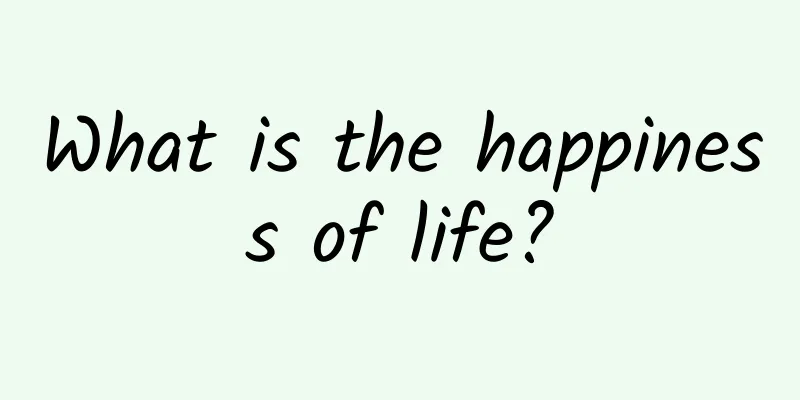What is the happiness of life?

|
Leviathan Press: "Don't have too many expectations" - this phrase in our daily life actually reveals a kind of psychological construction about the source of happiness, but it is difficult for us to fully achieve this in practice. It's like you have seen a high-quality movie, and naturally you are full of expectations for the next one of this director. But as this article says, keeping low expectations for a long time will not make you happy, and may even make you more negative. In the final analysis, it is precisely because of the unpredictability of the future that you can have the possibility of happiness. Last December, I suddenly suffered from insomnia for a while. After a few sleepless nights, I felt that my life had become an extremely difficult day that would never end. The rest of my life was good, but because I couldn't sleep, all of these were in vain, and life lost its meaning. This went on for a few weeks, and I tried many conventional, gentle methods to improve my sleep, but none of them worked. So I began to fantasize about more violent methods, such as knocking myself out and covering myself with a warm blanket until I lost consciousness, even though this was a disguised form of suicide. What scares me is that no matter how well everything seems to be going, little everyday things like lack of sleep can completely ruin our happiness. There are two main definitions of happiness, referring to different time periods. One is about your mood in the moment, and the other reflects a more global feeling that encompasses your life and surroundings. The two cannot be completely separated. Even though I was generally satisfied with my life, on days when I couldn’t sleep, my happiness was mostly ruined by fatigue, and at night, I felt like my mind was stuck in a turbulent space with no way to calm down and always thinking about meaningless things, which was the exact opposite of contentment. Happiness is affected by the perception of time, which itself can be affected by many factors, such as lack of sleep, medication and age. Time seems to move more slowly in childhood than it does in adulthood. Children often feel like they have plenty of time left to live. Older people feel like they've already lived most of their lives. But at any age, something can happen to suddenly derail you from the "normal" realm of life. “What scares me is that no matter how well things seem to be going, something as small as a lack of sleep can completely ruin our happiness.” © Laurindo FelicianoIn the essay “Time Lived, Without Its Flow,” the poet Denise Riley describes “a strange feeling of being ripped out of time” after the sudden loss of her child. She felt that the future, or the sense of life flowing, was gone, replaced by a strange “glowy emptiness.” Events and expectations Robb Rutledge, a cognitive and computational neuroscientist who studies present-moment happiness, and his lab developed an equation to predict happiness. It looks like this: This formula may seem complicated, but in the final analysis, Rutledge's team found that momentary happiness "is not about how well things go, but whether things are better than expected." In the study, they asked thousands of people to participate in various luck-based games and report their happiness levels at different stages. Whether they won the game was not important in predicting their happiness; what was important was whether they performed better or worse than they expected. Research shows that our expectations influence our happiness as much as real-life events. “Happiness is often considered to be our core purpose in life, even though it is elusive—it is either in the past or somewhere else.” “Time is constantly changing, and so are our thoughts, changing with the ever-changing present, projecting forward and backward through time.” © Laurindo FelicianoThese findings made intuitive sense to me, but they pointed to something I hadn’t considered before. I used to think of overall happiness as a deeper kind of happiness, and momentary happiness as a more natural, present-moment kind of happiness. But Rutledge’s formula treats even momentary happiness as an expectation, a prediction of the future, even if it only happens in the blink of an eye. But we don’t remain still and forever in the present moment – time is constantly changing, and so are our thoughts, which change with the ever-changing present, projecting forward and backward as time passes. I often don't realize what my expectations are until I'm happy or disappointed, then I realize I must have been hoping for a better outcome or expecting a worse outcome. When my expectations are low or nonexistent, I usually feel great. But I don’t think the secret to happiness is to keep expectations low. Always expecting the worst can lead to negativity, and, anyway, expecting a good outcome often motivates me to do the things that make me happy in the first place. Trying to determine happiness Expectations themselves are often based on a collection of personal experiences: I fell flat on my face last time, so I’ll probably do the same thing this time (maybe I’ll use my hands to catch myself). I did well in school, so I’ll probably do well at work. My parents own a house, so maybe I’ll own one when I’m their age. No one I know is a lawyer, so maybe it’s not the right profession for me. Our expectations can change over time and are influenced by wider forces than our own personal experiences. The stories we read and watch tell us what life should be like at different ages, which of course creates stereotypes. “Kids tend to feel like they have a lot of time left. Older people feel like they’ve already lived most of their lives.” © Laurindo Feliciano When James Marriott wrote in the New York Times about the emotional intensity of young people, columnist David Aaronovitch wrote about how his middle age was much more emotionally painful. Many people tweeted that they disagreed with the inevitable generalizations the two men made, especially Aaronovitch’s assertion that young people are incapable of strong emotions. Empathizing with other people’s experiences, real or imagined, can be reassuring, but no one likes to feel like their life is set in stone. In my dark moments, I occasionally have a mental image of a computer running code, following instructions line by line until it’s done. Everything seemed set in stone, and this negative feeling prevented me from appreciating how unpredictable life was, and how full of possibilities, both good and bad. Expectations were taken up, and then gone. I couldn't imagine what the future would hold, and I was pretty sure that whatever happened, it wouldn't excite me. Fortunately, I haven’t felt this way in a long time. When I’m in a good mood, I often make small plans for the future, whether it’s catching up with friends or browsing cat rescue websites. Happiness is often considered a central goal in our lives, even though it is elusive—it is either in the past or somewhere else. We are more likely to experience happiness after the fact. If we stop to ask ourselves whether we are happy at the moment, we risk disappointing our hopes. The uncertainty of happiness makes it difficult to write about it directly, and in this article, I have used two personal experiences with pain rather than happiness to describe happiness. But joy comes in different forms as we move through different stages of life. It seeps in at different moments, expected or not. When we try to freeze joy, capture it in a photograph, or simply define it, the emotion is lost. It is not a static ideal, but something we can only experience as we live our lives. By Kate Wilkinson Translated by Rachel Proofreading/boomchacha Original article/wellcomecollection.org/articles/YNGfvhIAACAAkSab This article is based on the Creative Commons License (BY-NC) and is published by Rachel on Leviathan The article only reflects the author's views and does not necessarily represent the position of Leviathan |
<<: Why is the heart of the white radish blue? (Maybe it's a hybrid of red and blue)
>>: Why is collagen considered a beauty product? Can collagen whiten the skin?
Recommend
A small stone "destroyed" a kidney! His experience sounded a wake-up call for everyone
The second Thursday of March every year is World ...
Tips for relieving early pregnancy reactions
In fact, in the early stages of pregnancy (the fi...
Will amniotic fluid leak in late pregnancy?
During a woman's pregnancy, while the fetus i...
What are the preparations for pregnancy?
We all know that being able to give birth to a he...
Why are the things of white-collar women bigger than those of ordinary people?
Among modern female white-collar workers in the w...
How to take care of yourself after hysterectomy?
Every woman hopes to be healthy and beautiful, bu...
What causes vulvar dystrophy?
The explanation of vulvar malnutrition in traditi...
Onavo: Twitter is only 60% of Instagram on the US iPhone platform
Twitter is only 60% of Instagram on the iPhone in ...
Can women do sit-ups to reduce belly fat?
Women can reduce belly fat by doing sit-ups, but ...
How many days can I have a medical abortion?
Medical abortion is a method of abortion. This me...
How to prepare for pregnancy
After a period of time after marriage, if a woman...
What should I do if I have menstrual cramps for the first time after an abortion?
There are many pregnant women who are unable to h...
How can women with double chins get rid of them?
Many women have the problem of double chins. Wome...
Did you find out you were pregnant very late?
Nowadays, many attractive couples are planning to...









